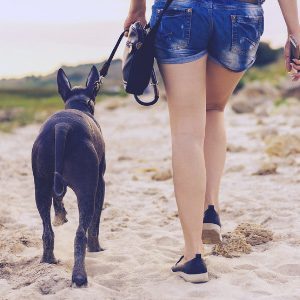When is non-surgical management off CCL disease recommended?
If your dog has a tear or sprain in their CCL (read more here), surgery is typically the fastest way of returning your pet to an active lifestyle and considered the gold-standard, first line recommendation.
However, surgery may not be the best option for you or your dog for a variety of reasons including concurrent medical conditions or financial limitations. And this is OK! Please know that you must make the best decision for you and your family. If surgery is not in the cards, there are other ways to help your dog be comfortable and have a good quality of life. However, life-long management of arthritis should be expected.
What does non-surgical treatment involve?
General goals of non-surgical management of CCL tears:
- Control pain associated with arthritis
- Strengthen the muscles supporting the knee joint
- Support the whole body- strength, proprioception, joint health
- Weight loss/management
The ultimate aim of this management is to optimize your dog’s ability to carry out their normal daily activities and maintain a good quality of life. However, non-surgical management can be challenging in terms of activity restrictions and avoiding situations that could lead to complete rupture of the CCL, tearing of the meniscus, or exacerbation of ongoing arthritis- all of which will make the limping worse.
Non-surgical Management of CCL tears may include:
- Pain relievers: NSAIDs are typically recommended unless your dog is not tolerant of them. Other pain relievers might be added if your dog’s pain is not controlled with NSAIDs alone. Librela is not indicated for dogs with CCL tears.
- Ice:
- If tolerated, we recommend ice packing the knee joint (stifle) for 20 minutes after walks or exercise. Ice is a very powerful and natural anti-inflammatory technique.
- Physical rehabilitation: A rehabilitation veterinarian or physical therapist can help develop a custom plan for your dog to help strengthen their muscles and support the rest of their body. But please note that rehabilitation is not a substitute for surgery.
- Activity modification:
- Leash walking only for at least 3 months.
- This means no running, jumping, playing or dog-park trips!
- Leash walks of gradually increasing duration will be recommended, including uphill walking.
- Swimming is not recommended unless it is done in a rehabilitation setting (no open water swimming).
- Life-long activity modification will be indicated to reduce flare-ups of arthritis.
- Joint support supplements: Omega-3 fatty acids, undenatured collagen II (such as Flexadin Advanced) and Adequan may be helpful to support joint health. There is limited evidence for other types of joint supplements.
- Intra-articular injections: Injections into the knee joint might help reduce pain and inflammation and support joint health, but these are not a substitute for surgery or expected to heal the CCL.
What about a brace?
Braces are not a substitute for surgery and are typically not recommended for CCL tears in dogs. A brace WILL NOT stabilize the knee joint and replace the function of the CCL, despite what you might read or hear. A brace might provide proprioceptive feedback and make your dog’s leg feel a bit better, similar to how a neoprene wrap might make your joint feel better. If a brace is going to be used, it should be a custom-made orthotic designed specifically for your dog. You should work with a rehabilitation veterinarian or experienced orthotic specialist to ensure the brace fits appropriately. One study found that nearly 40% of dogs with a custom stifle orthotic experienced skin-related complications in the first 3 months (Rosen S, et al. 2022). Sometimes the cost of an orthotic, including all of the expected rechecks and revisions, can approach the cost of surgery.
Reviewed/updated 12/2024

